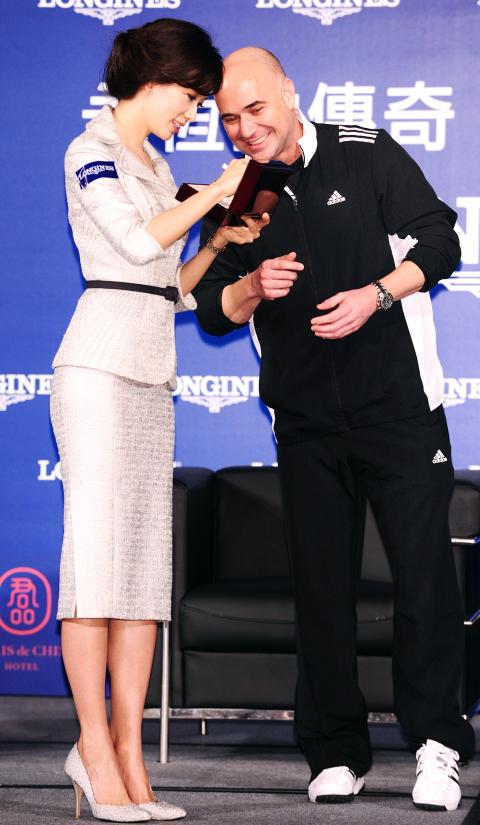Model and actress Lin Chi-ling (林志玲) hopes to follow the example of retired tennis player Andre Agassi and establish a charitable foundation to help needy children.
Lin drew inspiration for her ambition at a charity event in Taipei last month that she attended along with Agassi. At the event, which raised NT$1.5 million (US$51,670) for three social welfare groups, including the Taiwan Foundation for Rare Disorders, Lin renewed her acquaintance with Wu I-hsin (巫以欣), an 18-year-old girl suffering from Niemann-Pick disease.
Having first met Wu at an event arranged by the foundation three years earlier, Lin was shocked to find that Wu’s condition had worsened and that her younger brother had also fallen ill with the disease.

File Photo: Pan Shao-tang, Taipei Times
Seeing the difficulties Wu and her brother had to deal with, Lin said she hoped she could do more to help children like them, including setting up her own foundation.
The top model is no stranger to charitable activities. She served as an ambassador for the “HIV/AIDS Hope Initiative” organized by World Vision Taiwan in 2006, when she went to Swaziland to visit orphans whose parents had died of AIDS.
“Through the visit to children, I gained the power to go forward. Charity shouldn’t just be talk, but be carried out as a part of our life,” Lin said.
As for her own future, the model said: “Looking ahead to 2011, I hope that I can have more time to be with my family, or go on a trip to study or take a vacation and think carefully about the next step of my life.”
One of her options, she said, would be to follow the example of Agassi and his wife, Steffi Graf, and set up a charitable foundation.
Agassi set up the Andre Agassi Foundation for Education in 1994 to help children and in 2001 established the Andre Agassi College Preparatory Academy, a tuition-free charter school for at-risk children.

Taiwan is stepping up plans to create self-sufficient supply chains for combat drones and increase foreign orders from the US to counter China’s numerical superiority, a defense official said on Saturday. Commenting on condition of anonymity, the official said the nation’s armed forces are in agreement with US Admiral Samuel Paparo’s assessment that Taiwan’s military must be prepared to turn the nation’s waters into a “hellscape” for the Chinese People’s Liberation Army (PLA). Paparo, the commander of the US Indo-Pacific Command, reiterated the concept during a Congressional hearing in Washington on Wednesday. He first coined the term in a security conference last

Prosecutors today declined to say who was questioned regarding alleged forgery on petitions to recall Democratic Progressive Party (DPP) legislators, after Chinese-language media earlier reported that members of the Chinese Nationalist Party (KMT) Youth League were brought in for questioning. The Ministry of Justice Investigation Bureau confirmed that two people had been questioned, but did not disclose any further information about the ongoing investigation. KMT Youth League members Lee Hsiao-liang (李孝亮) and Liu Szu-yin (劉思吟) — who are leading the effort to recall DPP caucus chief executive Rosalia Wu (吳思瑤) and Legislator Wu Pei-yi (吳沛憶) — both posted on Facebook saying: “I

Sung Chien-liang (宋建樑), who led efforts to recall Democratic Progressive Party (DPP) Legislator Lee Kun-cheng (李坤城), was released on bail of NT$80,000 today amid outcry over his decision to wear a Nazi armband to questioning the night before. Sung arrived at the New Taipei District Prosecutors’ Office for questioning in a recall petition forgery case last night wearing a red armband bearing a swastika, carrying a copy of Adolf Hitler’s Mein Kampf and giving a Nazi salute. Sung left the building at 1:15am without the armband and covering the book with his coat. Lee said today that this is a serious

The Ministry of Economic Affairs has fined Taobao NT$1.2 million (US$36,912) for advertisements that exceed its approved business scope, requiring the Chinese e-commerce platform to make corrections in the first half of this year or its license may be revoked. Lawmakers have called for stricter enforcement of Chinese e-commerce platforms and measures to prevent China from laundering its goods through Taiwan in response to US President Donald Trump’s heavy tariffs on China. The Legislative Yuan’s Finance Committee met today to discuss policies to prevent China from dumping goods in Taiwan, inviting government agencies to report. Democratic Progressive Party Legislator Kuo Kuo-wen (郭國文) said